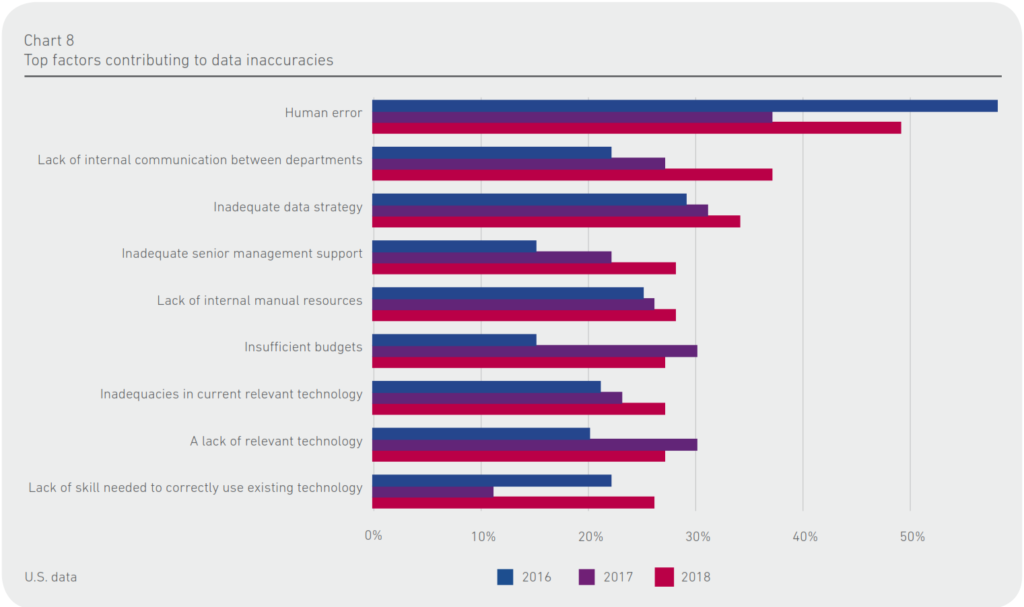| Summary: | What does data management mean in this Digital Age and do you have to worry about Can you trust your data? |
| Article Type: | Blog |
| Related Product(s): | This article relates to the following products:
|
Can you trust your data?
Insights from Experian’s 2018 global data management benchmark report
The Digital Age
In today’s business arena, we have access to more information than ever. With an ever-growing reliance on technology and social media, masses of data are being collected every day, at every customer touchpoint. The potential benefits of collecting this data are huge, from gaining greater customer insights to making smarter, real-time decisions. However, managing this huge volume of data is often more problematic.

According to a 2018 Experian global data report, the vast majority of C-level executives that were surveyed (87%) said that data has greatly disrupted their organization’s operations over the last 12 months.
Data Quantity versus Quality
“The era of quantity over quality data is well and truly over.” – Experian Data Quality
We all know that collecting data is the easy part. The key is extracting good-quality data through an effective and well-planned strategy. Data that is untrustworthy is not only of little value but can also be detrimental to your business.
Whilst customer experience is cited repeatedly as a top priority for organizations, 89 percent of C-level executives agree that inaccurate data is undermining their ability to provide an excellent customer experience.*
Another area of concern when it comes to this vast amount of information is data governance.
84 percent of C-level executives agree that the increasing volumes of data make it difficult to meet their regulatory obligations.*
If you have a sneaking suspicion that your data is not up to scratch, you’re not alone.
Figures from Experian show that, on average, respondents in the U.S. believe that 33 percent of their customer and prospect data is inaccurate in some way.
Data Management and Ownership
Unfortunately, many executives find the subject of data management to be boring or can’t see the value of it over other projects and pay only lip service to the need for the business to focus on it – until they realize how much is really at stake.
- Damages the corporate image.
- Increases staff costs.
- Increases marketing costs.
- Inaccurate reporting.
Another grey area is data ownership, with many businesses unclear of who is responsible or lacking the authority to take control of the data strategy. Of those surveyed, 51% said that their data was owned by their IT department. However, those surveyed did realize that having a more centralized owner, would be a more effective solution in the era of big data and the need for real-time data: ‘91 percent of C-level executives say that they believe the responsibility for data quality should ultimately lie within the business with occasional help from IT.’
Causes of Inaccurate Data
Out of all the causes cited in the 2018 Experian report, human error was the top cause with 49% of US companies saying this was a contributing factor.

Resolving human error is a challenging task when great volumes of data are generated and edited daily from a variety of sources. To help minimize inaccurate and incomplete records, duplicate data, and typos, it is important to have adequate governance to ensure that common rules are being followed. Also, software that can check data at the point of capture and clean data after it has been collected.
Conclusion
Don’t let bad data ruin your business. Having quality data that you can trust is far more valuable and problem averse than focusing on quantity. At QWARE, we can help you to achieve quality data that you can trust with Paribus 365™.
If you’d like to start to manage and understand your company data, take a free trial of Paribus 365™, our duplicate data prevention and cure solution.
*Source: 2018 Experian global data management benchmark report
| Related Resources: | |
| Further Information: |
